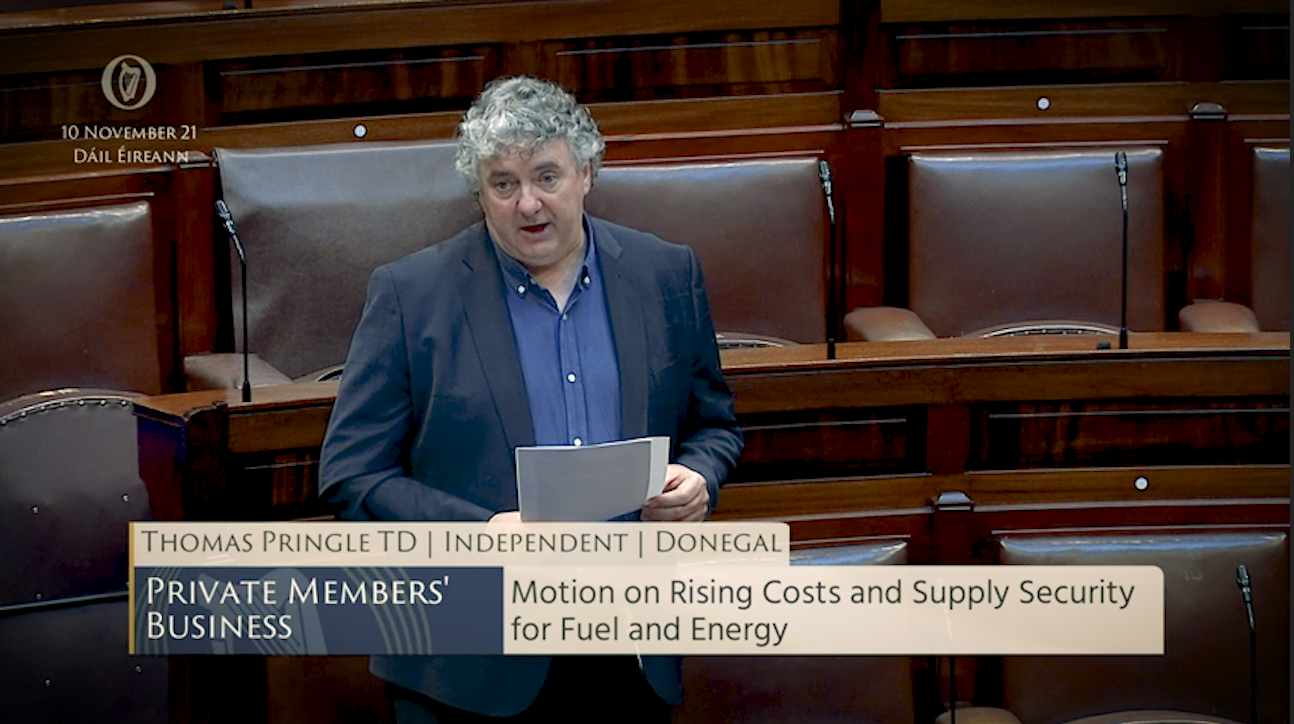- Pringle: We need a policy that recognises the importance of inshore fishing
- Pringle: Disabled people and carers face crisis of State neglect
- Pringle: Failed FF/FG housing policies forcing people to put their lives on hold
- Pringle welcomes Donegal council motion on Occupied Territories Bill: ‘We cannot stand by in the face of genocide’
Pringle: If we accept data centres, they must pay their share in pollution taxes
- Updated: 10th November 2021

Independent TD for Donegal, Thomas Pringle, said Government cannot expect citizens to pay carbon taxes without enforcing a pollution tax on data centres, which are set to double the country’s power demand by the end of the decade.
Addressing the Dáil today, Deputy Pringle said: “It is extremely concerning to read the Eirgrid’s winter outlook that our electricity system will be operating at double the maximum safety threshold for the potential loss of power.
“Their predictions that this country could face electricity deficits for the next five years are particularly worrying. The fact that we may be facing winter power blackouts is truly terrifying, yet somehow this government doesn’t seem too phased about the prospect of this at all.
“Instead, we are expected to roll out the red carpet for data centres, which are set to double our power demand by the end of the decade. We are expected to make personal sacrifices, to wrap up and reduce our electric consumption in order to cut carbon emissions, while at the same time welcoming the development of these data centres who guzzle all our energy. We are expected to accept over 30 different price increase announcements from energy suppliers, with costs expected to rise by a staggering €500 per household.
“Well, I refuse to accept this,” he said.
The deputy said it was “absolutely shocking” that the Government’s climate action plan states that data centres are forecast to take up to 23 per cent of Ireland’s electricity demand by 2030.
Deputy Pringle said: “Despite this we’re not imposing any environmental conditions on these centres, which are putting huge pressure on our country’s energy infrastructure.” He said at the very least Government should require the centres to pay an environmental tax for the demands they are putting on the country’s electricity infrastructure and water resources.
He said: “It is completely unacceptable that this government is willing to look after these big corporations over the needs of its own citizens. To ask them to make sacrifices, endure price hikes and to pay ridiculous carbon taxes, as if it would make one iota of difference what individuals do when data centres aren’t being subjected to any sort of environmental conditions.”
The deputy said he has had constituents come to his Donegal office who have been waiting for more than two years to be awarded their SEAI grant. A tax on the centres would allow for more funding for such initiatives as increasing the fuel allowance and addressing the SEAI grant backlog, he said.
Deputy Pringle said: “A pollution tax would give us the means to properly fund policies that support sustainable energy and transport, rather than unfair carbon taxes which we know disproportionately affect low-income families and especially those in rural communities who have extremely limited access to public transport or alternative fuel sources.”
He repeated his call for a focus on wind and hydroelectric power, saying, “It has been proven that Ireland could be energy independent in the next 10 years using only wind and hydroelectric power.”
Deputy Pringle said: “We all know that consumerism and capitalism are the real causes of environmental decline, and in order to truly address the energy crisis we need to stop the development of these data centres to the detriment of our citizens.”



